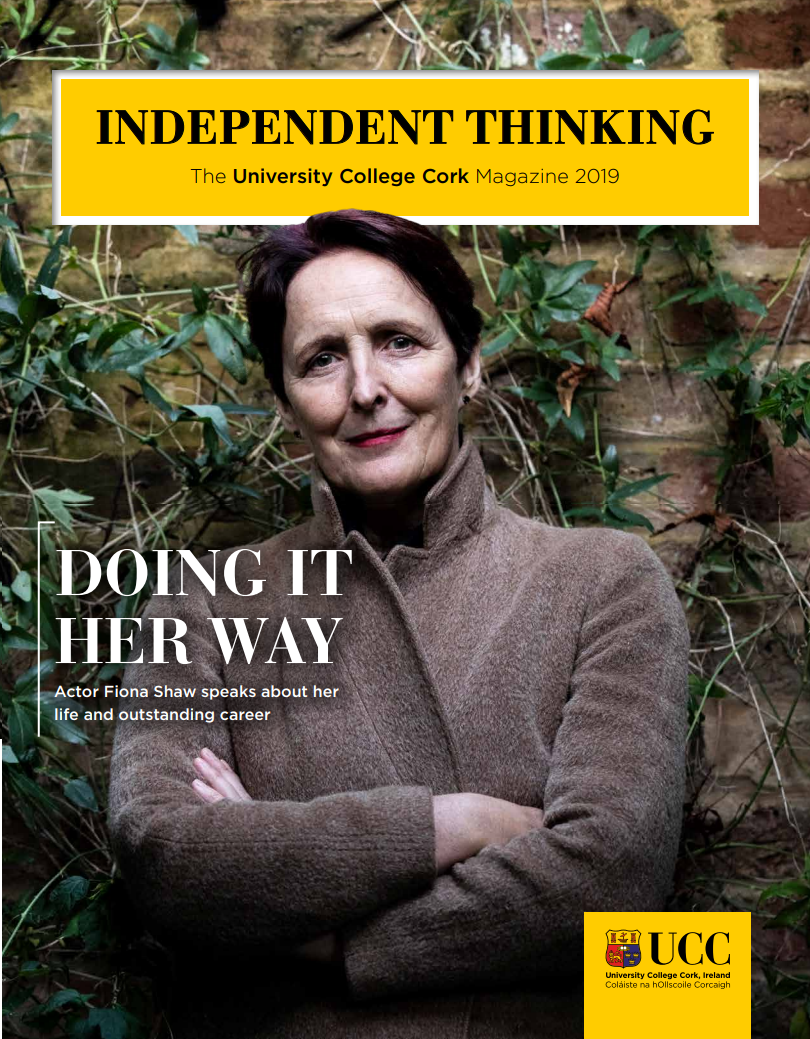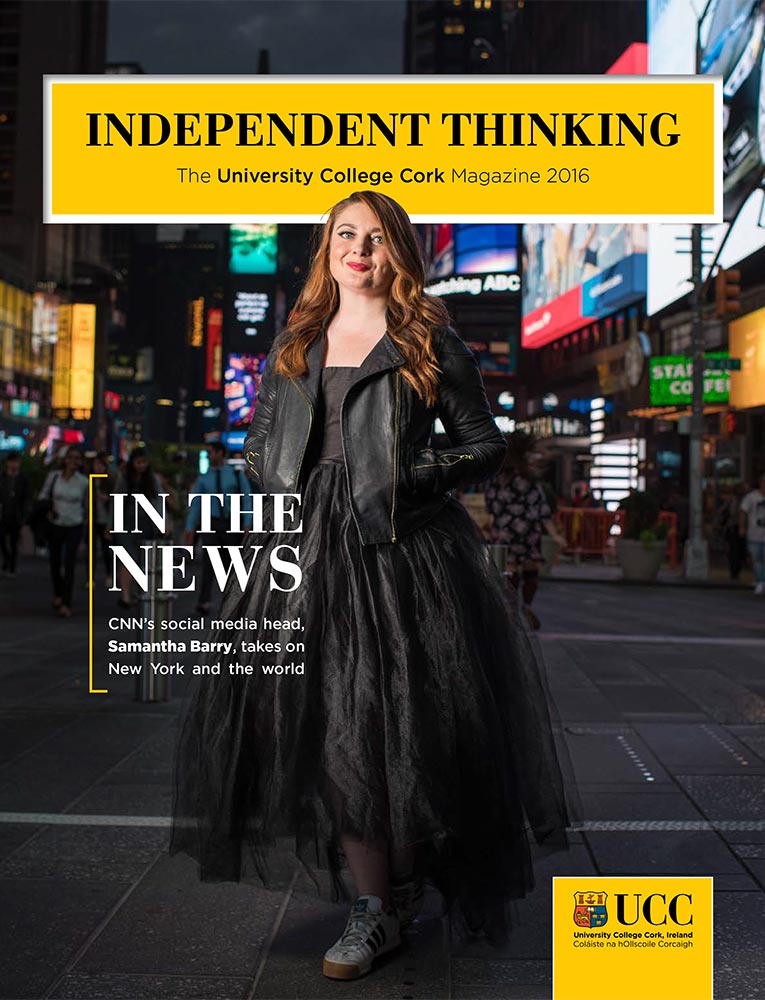Features
- President's Welcome
- Raising Hope
- Back to UCC for Cork’s Crime Writing Queen
- Committed to Memory
- An Ghaeilge i Lár an Aonaigh san Aontas Eorpach
- UCC Love Stories: Summer 2023
- Spotlight On Sport
- Crassvirus Breakthrough Is A ‘Crowning Moment’
- Envisioning Future Sustainable Cities
- The ‘Living Classroom’: Engaging With the ‘Great Existential Challenges of Our Time’
- Summer Celebrations
Envisioning Future Sustainable Cities
Dr Marguerite Nyhan is a sustainability and environmental engineering academic who specialises in the science of sustainable cities. Having recently been awarded prestigious Science Foundation Ireland Frontiers for the Future funding, Dr Nyhan shares insights on how the responsible use of technology can help solve global urban sustainability challenges.

Urbanisation is occurring at an unprecedented rate worldwide, and this trend is posing immense challenges to urban sustainability, liveability and public health. According to the United Nations, 55 per cent of the world’s population lives in urban areas, and this is set to increase to almost 70 per cent by the year 2050. Cities are complex places that evolve and respond to what’s happening over time and they represent microcosms of global economic development, environmental change along with human and social development. While cities make significant contributions to the creation of wealth, innovation and cultural advancement, they have also gained a central role in relation to the discourse on sustainability in recent times.
My Science Foundation Ireland-funded ‘Environmental Intelligence’ project aims to significantly advance the science of sustainable, net zero, healthy and liveable future cities. This ground-breaking research will harness state-of-the-art technologies including sensors, large-scale digital datasets, artificial intelligence, and digital twins to understand the sustainability pulse of cities. This includes understanding the dynamics of urban populations and transport systems, the changing patterns of emissions and air pollution, and the varying distributions of greenspace in unprecedented accuracy and scale in several cities in Ireland and the United States. Importantly, this research will also examine how interactions among these different factors affect environmental health outcomes. This will inform optimal climate policies including greenhouse gas mitigation and green urban planning which will shape sustainable future cities.
Urbanisation is intrinsically linked to several global sustainability challenges, but what are these and how will we solve them?
Accelerating climate change is adversely impacting on our cities globally. Cities are key hotspots of vulnerability to the risk that rising sea levels, increasing temperatures and severe weather events are all posing to our infrastructure, economies, health and biodiversity. In response to accelerating climate change impacts, greenhouse gas emissions need to be reduced towards net zero and this requires a rapid global reduction in emissions and a transition to a sustainable future.
Cities are also major drivers of climate change and account for up to 70 per cent of global greenhouse gas emissions. So, without ambitious decarbonisation strategies, rapid urbanisation may both escalate cities’ contribution to emissions and intensify the effects of climate change. Future-proofed sustainable urban design and policies are essential to mitigate greenhouse gas emissions and assist in the development of climate-resilient cities.
With accelerating urbanisation and the vulnerability of cities to climate change risks, it is important that cities are to the fore of decarbonisation efforts. Recently, an increasing number of cities are taking action and setting emission reduction targets. The Global Covenant of Mayors, the Climate Ambition Alliance and Race to Zero led by the United Nations are global initiatives which are committed to halving emissions by 2030 and achieving net zero by 2050. Even more ambitious is the European Union’s target of ‘100 climate-neutral and smart cities’ by 2030. As part of this, Irish cities including Cork and Dublin are taking major steps to decarbonise and become more sustainable from an environmental, economic and societal perspective. It is envisioned that these cities will be exemplars of best practice in relation to climate action and sustainability for other cities to follow.
With consensus on the need to reduce greenhouse gas emissions, there is also an urgent need to determine optimal strategies for maximising the air quality, health and economic co-benefits of such efforts where possible. According to the World Health Organization, outdoor air pollution contributes to 4.2 million premature deaths each year globally, with the vast majority of these occurring in urban areas. There is great potential for reducing climate-relevant emissions and health-relevant air pollution emissions together, and the science of this is gathering momentum. Urban greening promotes active and low-carbon travel and offers a way of reducing air pollution while also boosting public health and wellbeing. So, we need to unlock this potential; and while we aim to understand the complexities of sustainable cities, we need to ensure that we are thinking holistically and that we are harmoniously solving multiple decarbonisation and sustainability challenges together.
In order to solve complex urban sustainability challenges, we need to scale up technology- and data-driven urban environmental monitoring platforms. These will be powered by vast digital datasets including from networks of sensors, smartphones and satellites. Data-driven platforms can monitor energy use in our transport systems, track our emissions, elucidate air pollution hotspots, and quantify urban greenspace in unprecedented resolution and scale. These will be supported by real-time analytics, digital twin systems and urban dashboards which will help support sustainable city and citizen decision-making. Sustainable cities are orchestras playing music of data, but they need a conductor to play in time and in tune with our modern world.
In order to achieve ambitious emissions-reduction targets, state-of-the-art urban environmental platforms which will analyse current and future scenarios and identify effective approaches must be used. These will determine equitable emissions reduction and green urban planning policies for maximising air quality and health co-benefits across urban areas. As such, data-driven platforms can inform the design of multifaceted solutions for sustainable, net zero, healthy and liveable future cities.
As we decarbonise our cities and make them more sustainable, we need to ensure that we protect the most vulnerable in society. We need to promote a just transition and ensure that our decarbonisation efforts and policies reduce inequalities. Furthermore, while it would be remiss not to use data and technology to support our decisions, we need to ensure that it’s applied in a responsible and ethical way. By embedding an ethical human-centric approach, we can maximise the positive impact that technology can have on sustainable and net zero cities while safeguarding individual rights. This includes ensuring that data that is used for sustainability decision-making is representative of all demographics and ensuring that algorithms and models used are open and transparent. These will shape ethical practices in urban decarbonisation and sustainable urban planning, design and operations, and foster a sustainable future that leaves no one behind.
Dr Marguerite Nyhan is an Associate Professor/Senior Lecturer in Future Sustainability & Environmental Engineering. Dr Nyhan directs Sustainable Futures, founded the Sustainable Futures Lab, and directs a successful research group at UCC. Prior to joining UCC, Dr Nyhan worked at Massachusetts Institute of Technology, Harvard University and the United Nations.
For more information, visit the Office of Sustainability and Climate Action website.
Photography: Provision



